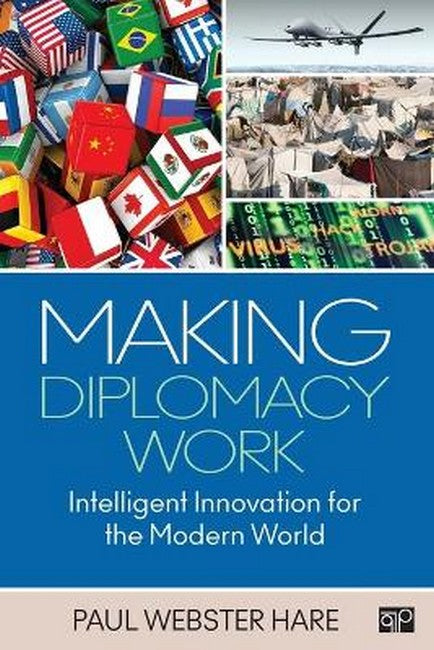Paul Webster Hare teaches courses on Cuba in transition, on diplomacy, and on arms control at Boston University. A British diplomat for 30 years, Hare served overseas at the UK Representation to the EU in Brussels, Portugal, New York, and Venezuela as Deputy Head of Mission. He was head of the Foreign Office's Non-Proliferation Department and the first project director for the UK's presence at the Shanghai World Expo in 2010. From 2001-2004, Hare served as the British ambassador to Cuba. He is a fellow of the Weatherhead Center for International Affairs at Harvard University and a member of the Brookings Institution Core Group on Cuba and has been designated a lieutenant of the Royal Victorian Order by Her Majesty Queen Elizabeth II. In addition, Ambassador Hare was president of the British Baseball Federation from 2000-2001.
Request Academic Copy
Please copy the ISBN for submitting review copy form
Description
Preface Acknowledgments Introduction About the Author Chapter 1: Diplomacy in History The Building Blocks of Modern Diplomacy Diplomacy and Collective Action Revolutions, Wars, and the Changing World States and Leaders Decline Diplomacy and Foreign Policy Suggestions for Further Reading Chapter 2: Who Are the Diplomats and How Do They Operate? The Evolution of the Diplomatic Cadre The Use of Intelligence Professionals or Politicians? Diplomatic Privileges and Immunities The VCDR and VCCR What Is Changing In Diplomats' Behavior? Diplomatic Asylum Case Studies ... And Personally Suggestions for Further Reading Chapter 3: The Institutions of Bilateral Diplomacy - Precedence, Protocol, Ministries, Embassies Ministries The Modern Ministries of Foreign Affairs Examples of Ministries of Foreign Affairs in Action Roles of Embassies and Consulates Embassies Losing Their Grip? How Are Embassies Staffed? New and Old Tasks Competition The Future of Diplomatic Missions Case Studies - How Embassies Operate Nevertheless Useful Suggestions for Further Reading Chapter 4: The Institutions of Multilateral Diplomacy The United Nations The Charter of the United Nations The Organs of the UN The Security Council ESOSOC International Court Of Justice The UN Secretariat Diplomats and the UN The UN's Development Different Worlds: Different UN Case Studies: The Charter And The UNSCR: The Iraq Crises of 1990-2001 and 2003 Following Diplomatic and Military Success: New Tasks UNSCOM and UNMOVIC Success Conclusion Suggestions for Further Reading Chapter 5: Regional Diplomacy and the Gs. The Rise of Summitry The Non-Aligned Movement The European Union Special Competencies The EU and Domestic Policies The EU Institutions: A Modern Crisis of Supranational Diplomacy? Is Accountability a Part of the EU? The EU's Success in Diplomacy The EU as a Diplomatic Service The EU Case Studies The EU Case Studies The African Union Asean Latin America Other Regions Other Groups Summits and the Gs Innovation from Groups Issue Groups Suggestions for Further Reading Chapter 6: Negotiations Framing an Issue The Raw Material of Diplomatic Negotiations Culture Elements Required For Success: Pre-Negotiations Mediation Strategy and Progress Case Study: The INF Negotiation 1980-1987 Continuous Negotiation Case Study: Negotiation in Cuba Suggestions for Further Reading Chapter 7: Public Diplomacy Public Diplomacy in the Past Propaganda? Public Diplomacy for Today's World Effective Public Diplomacy Public Diplomacy in Practice Conclusions and Case Studies Unlimited Ideas Suggestions for Further Reading Chapter 8: Public Goods: Treaties and International Law Treaties Laws, Rules, and Diplomacy War and Its Rules The United Nations Genocide Terrorism Human Rights Non-Proliferation of Nuclear Weapons Climate Change World Trade/World Finance Diplomacy and Law: The Problem of Enforcement and Implementation Suggestions for Further Reading Chapter 9: The New Diplomatic Agenda: The Challenges for Diplomatic Reform Why Reform? Diplomatic Priorities The New Agenda - Corruption Decline of Sovereign States The New Agenda? Diplomacy Steps Up Diplomatic Reform Sovereign Wealth Funds Development Assistance in the Diplomatic Agenda Case Study of the New Agenda - Nation Building in Afghanistan Conclusion Suggestions for Further Reading Chapter 10: The Non-State Actors: Global Citizens and Global Diplomacy The Globalization of Identity - The International Community? The Non-State Actors Global Citizens? States and Non-States in Diplomacy Beyond States - The Non-State Advantage? The Battle Of Ideas - States v. Non-States? Common Need: Common Reform Case Study - Haiti and the Earthquake - State and Non-State, The Republic Of NGOs, The Alms Merchant Conclusion Haiti and Rwanda Suggestions for Further Reading Chapter 11: The Continuing Information and Communication Revolution - Awaiting the Response of Diplomacy The ICR and E-Diplomacy International Chatter The ICR and A Shrinking World Diplomacy and the Apps Oh - And What about Radio and Television? Global Governance of the ICR The Positives and Negatives For Diplomacy - Communications Unlocks Potential And Produces New Weapons Communications: It's A Small World: The Global Whistle Blower and Global Activism Conclusion Suggestions for Further Reading Chapter 12: Diplomacy in 2025 Diplomacy in 1945 The Reassertion of Diplomacy Diplomacy Still Valid for 2025 Looking At the Future - The Issue of Stovepipes Complex Issues or Inadequate Diplomacy? The Forums for Discussion Permanent Crises Future Crises Intelligent, Versatile, Resourceful: The Diplomat In 2025 Suggestions for Further Reading Chapter 13: Diplomacy for the Ages 15 Ideas to Raise Diplomacy's Batting Average Final Thoughts
"A superb and compelling treatment of diplomacy's evolution as a dynamic institution. Hare provides an unvarnished look at diplomacy's continued relevance as well as its severe challenges in a world populated by diverse actors, including governments, companies, and NGOs. An essential primer for anyone entering this ancient and noble profession." -- Dr. Parag Khanna "Making Diplomacy Work is extremely comprehensive; it is clearly written by someone who has direct first-person experience in the practice of diplomacy. It covers territory that I have not seen in other textbooks. This is a welcomed addition to the textbook landscape." -- Marcus Holmes "The case studies are excellent and add a great deal to the book. The author's discussions about his own experience as a diplomat are also quite interesting. The author is clearly an accomplished expert in his field." -- Aaron Zack

